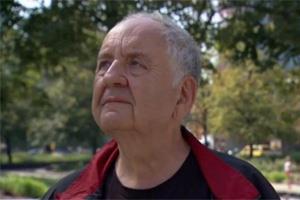Temple Beth El in Beckley, West Virginia commemorated their 28th Holocaust Remembrance Day this past Sunday. Each year on that day, Temple worshippers remember not only those who died in the Holocaust but the horror and depravity of all genocides, everywhere.
This particular annual ceremony of remembrance is relatively young — just 29-years-old — because the original founder, Holocaust survivor Max Lewin, kept his memories of desperation and deprivation bottled inside him for more than half a century. These were childhood memories he would just as soon forget — but he never could.
The memorial service was to include candle lighting, inspirational readings and prayers, and Lewin’s account, in his own words, of pain and survival, remembered from childhood.
Instructively, in a week when religious intolerance has once again inflamed the headlines, the ceremony was open to the public — and people of all faiths.
That’s part of the reason why the PBS Frontline program The Last Survivors seems so aptly timed. This sombre, thought-provoking documentary featuring four elderly Holocaust survivors speaking in their own words, premieres tonight on PBS at 10 p.m. ET (check local listings). It makes for poignant, profound viewing not because of its memories of the Holocaust — familiar to anyone who’s seen Schindler’s List or read Elie Wiesel’s slender, powerful classic, Night — but because, much like Lewin before them, Holocaust survivors (top, left to right) Ivor Perl, Susan Pollack, Frank Bright and Maurice Blik talk about how their childhood experiences shaped and informed their adult lives.
For these four men and women, their adult lives were not so much an act of remembrance and defiance but of unspeakable sadness, memories that remain impossible to forget.
When Ken Burns and Lynn Novick set about to make their 2007 PBS documentary miniseries The War, featuring firsthand accounts of the Second World War from those who fought and lived to tell about it, Burns told anyone who’d listen that it was vital to him and Novick to make the film when they did, because it was only a matter of time before veterans of the war passed away, taking with them their memories in their own words and voices. The Last Survivors is driven by a similar realization — though they may have been children at the time, these Holocaust survivors are now in the twilight of their years.
And if the program leaves one indelible impression, it’s that it’s not enough — it never was — so say these survivors have lived long and fulfilled lives despite their harrowing childhood experiences. In a world where synagogue shootings still happen suddenly and without warning, and leaders of free nations prattle on about “very fine people on both sides,” the Remembrance and Veterans’ Day’s aphorism “Lest we forget” can seem like empty words. We need these people to be with us, in life, to share their memories in person, to remind us of how some childhood traumas never truly leave us, no matter how wise, experienced and years-lived we become in later life.

When he made Schindler’s List, the filmmaker Steven Spielberg admitted he wrestled with how to end his fictionalized account of one of history’s most harrowing, tragic genocides. For many who saw Schindler’s List, the film’s coda — in which actual, real-life survivors, accompanied by the actors who played them in Spielberg’s reimagined history, leave commemorative stones on the graves of family members and friends who perished in the Holocaust — was the most moving moment in the entire film.
Spiritually and metaphorically, The Last Survivors is that moment, writ large and presented as an hour-long Frontline program.
Little more than 10 minutes into the program, Holocaust survivor Maya Jacobs-Wallfisch reads a letter her mother penned to her children, as a way of explaining in writing what she couldn’t express in words.
“Dear children,” Jacobs-Wallfisch reads, reciting her mother’s letter in a soft, halting voice. “I have written and compiled this document with one thought in my mind, namely that I am dedicating it to you and to your children. We have never talked much about those dark days or how it came about that you do not have any grandparents. At what point does one start explaining to one’s child that there are people in the world who had as their ideology the total annihilation of Jews and other undesirables and (purging) them in the most sophisticated manner.”
The Last Survivors matters, as Susan Pollack recounts in its closing moments, “You want to hear? Here it is. I encourage youngsters to ask us, because we are the last ones. When we’ve gone, it’s finished. Then it’s all history books.
“Anything else?”
Yes, most definitely. But there’s only so much time left.